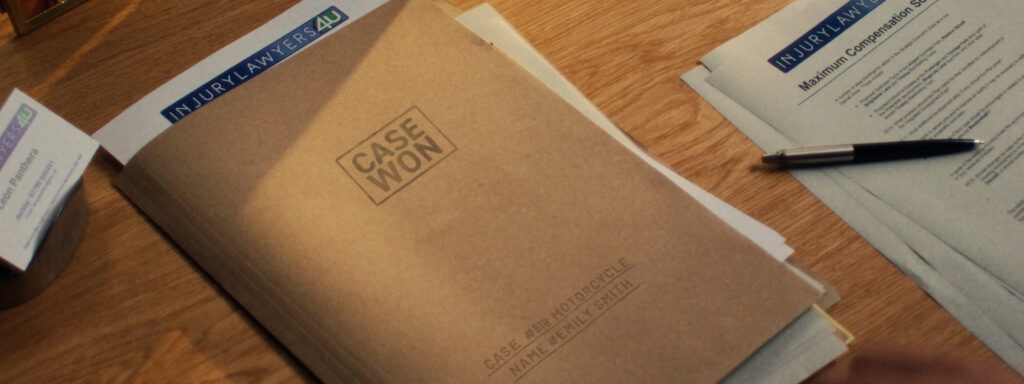Making a compensation claim for soft tissue injury
If you have suffered from a soft tissue injury in an accident or altercation for which another party is responsible, then you may be able to make a claim for compensation. Soft tissue injuries can range from minor strains that cause temporary discomfort, to severe tears and nerve damage with the potential to cause long-term pain and financial hardship through lost income and ongoing treatment.
At Injury Lawyers 4u, our experienced team is dedicated to helping you every step of the way throughout your claim, ensuring you receive the compensation you need to focus on recovery and cover any associated costs.
Common types of soft tissue injuries
A soft tissue injury can be damage to muscles, ligaments, or tendons. These injuries are often caused by trauma, overuse, or improper use. The most common symptoms include pain, swelling, bruising, and sometimes even loss of function in the affected area. Soft tissue injuries can vary greatly in severity, from minor strains that heal with rest to severe tears that could require surgery and long-term physiotherapy. Here are the most common types of soft tissue injury:
- Torn Ligaments: Ligaments are tough bands of tissue that connect bones to each other and stabilise joints. Torn ligaments can occur due to sudden twisting or impact and are often a result of sports accidents and falls. For example, when a footballer tears their ACL in the knee, this injury often means that they are out of action for many months.
- Strains: Strains involve the stretching or tearing of muscles or tendons, which is common with overstretching or overuse. The back and hamstrings are most notorious for this kind of injury.
- Sprains: These are injuries to ligaments that are caused by being stretched beyond their normal capacity. Ankle and wrist sprains are frequent and usually the result of slips, trips and falls or sudden twists.
- Pulled tendons: Tendons connect muscles to bones and can be injured through overuse or sudden, forceful movements. Pulled tendons tend to be most common in areas like the shoulders, elbows, and knees, as with cases of rotator cuff injuries or tennis elbow.
- Nerve damage: Soft tissue injuries can also include nerve damage, which might result in numbness, a tingling sensation, or general weakness in the affected area. This type of injury requires careful medical assessment and ongoing management.
- Deep muscle bruising: Also known as contusions, these often occur due to direct impact or trauma, leading to bleeding within the muscle. Deep muscle bruising can cause significant pain, swelling, and discolouration.
- Tendonitis: Tendonitis is the inflammation of a tendon, typically caused by repetitive strain or overuse. The most common areas that can suffer from tendonitis are the shoulders, elbows, and knees, such as in cases of achilles tendonitis.
If you think you have a soft tissue injury, it’s important to get a diagnosis and treatment as soon as possible. If you were injured in an accident that was the fault of another party, you could be eligible to make a personal injury claim.

Common causes of soft tissue injuries
Soft tissue injuries happen in many everyday situations, and often these injuries are due to someone else’s negligence. Here are some of the most common scenarios:
- Road traffic accidents: If you’re injured in a road accident that wasn’t your fault, you can hold the responsible driver accountable. This includes injuries from car, motorcycle, or pedestrian accidents.
- Workplace accidents: Unsafe work environments, inadequate training, faulty machinery or failure to provide personal protective equipment (PPE) can lead to injuries like strains from heavy lifting or slips and falls. It is the duty of employers to provide a safe working environment for staff.
- Sports injuries: Injuries can happen due to reckless play, lack of proper equipment, or poor supervision during sports activities, which can lead to torn ligaments or sprains.
- Gym injuries: Faulty equipment, lack of proper instruction, or poor supervision in gyms can cause all kinds of injury, including pulled tendons or strains.
- Public place accidents: Wet floors, uneven pavements, or poorly maintained facilities in public places can lead to sprain injuries or deep muscle bruising.
If you’ve suffered a soft tissue injury as a result of any of these scenarios, Injury Lawyers 4u can help you claim the compensation you deserve.
Common symptoms of soft tissue injuries
Soft tissue injury symptoms can present themselves in a variety of ways, and some of these symptoms may not be obvious or even present immediately after an accident. However, noticing these symptoms early and getting the right treatment as soon as possible can prevent further problems. Here is a quick guide to different types of soft tissue injury and their symptoms:
Sprains
Sprains happen when ligaments, which connect bones at a joint, are stretched or torn. Symptoms include:
- Pain around the joint
- Swelling and bruising
- Trouble moving the joint
- Sometimes a “pop” sound at the moment of injury
Strains
Strains happen when muscles or tendons are overstretched or torn. Here are the signs to look out for:
- Muscle pain and tenderness
- Swelling and bruising
- Muscle spasms or noticeable weakness
- Limited movement
Torn ligaments
Torn ligaments are caused by sudden twists or impacts. Here’s how you can tell if your soft tissue injury is a torn ligament:
- Intense pain where the injury occurred
- Major swelling and bruising
- Joint instability
- Difficulty bearing weight on the affected area
Pulled tendons
Pulled ligaments occur either through overuse or sudden, forceful movements. Here are the symptoms:
- Sharp pain in the tendon area
- Swelling and inflammation
- Difficulty moving the affected area
- Tenderness when touched
Nerve damage
Nerve damage often accompanies severe soft tissue injuries, causing the following symptoms:
- Numbness or tingling
- Sharp, burning pain
- Muscle weakness
- Loss of coordination
Generally, if you find yourself suffering from swelling, bruising, joint stiffness, difficulty moving in a certain way or unusual muscular pain, it’s likely you’ve sustained a muscle or soft tissue injury. In such cases, it’s important to consult a medical professional as soon as possible.

Am I eligible to make a soft tissue injury compensation claim?
If it was someone else’s duty to ensure your wellbeing and they failed in that duty, which resulted in you suffering damage and/or loss, then you may be entitled to make a claim for compensation against them.
At Injury Lawyers 4u, we can evaluate your situation and quickly advise you on whether or not your soft tissue injury and the circumstances that caused it will provide a solid case for compensation to be brought before the courts. You can rely on our many years of practical experience involving these types of cases, as well as our strong history of gaining compensation for victims.
What is the average compensation for a soft tissue injury claim in the UK?
The amount of compensation you could receive for a soft tissue injury varies depending on the severity and impact of your injury. Minor injuries, such as strains or sprains that heal within a few weeks can garner compensation in the region of £1,000 to 3,000. However, severe injuries that require surgery or lead to long-term issues can range from £10,000 to far beyond.
Use our compensation calculator to receive an estimate of the compensation you are likely to receive if your claim is successful. The estimate you’ll see is based on Judicial College Guidelines and covers general damages only. General damages relate directly to compensation for the pain and suffering the injury causes.
It’s important to note that general damages do not include financial losses or out-of-pocket expenses, which are covered under special damages. Special damages include costs such as medical bills, lost income, and any other expenses related to your injury. These are calculated separately to ensure you are fully reimbursed for your financial losses.
At Injury Lawyers 4u, our team of expert lawyers are happy to advise you regarding the amount and type of compensation you might be able to claim, and if there are any other circumstances surrounding your case that you may be able to claim for. For example, if you sustained a muscle injury in a car accident, you may be able to ask for compensation to the damage done to your vehicle as well as for your personal injury.
We also advise against accepting the first offer of compensation from your employer or insurance company. Soft tissue injuries may appear to heal quickly; however, there can be further complications later down the line. Talk to our approachable, down to earth solicitors before you accept any offers of compensation as they may be well below the sum that you are actually entitled to.
Injury Lawyers 4u work tirelessly to achieve the best result and the maximum amount of compensation for you, no matter what your circumstances. You can speak to a representative at any time 24 hours a day, seven days a week on 0333 400 4445, or use the contact form and we will call you straight back.
What are the time limits for making a soft tissue injury claim?
For most soft tissue injury claims, you have a three-year window to start the injury claim process. This time limit starts from the date of your accident or the date a medical professional diagnosed your injury. However, there are exceptions:
- If the injured person cannot manage their own legal affairs due to mental incapacity, the three-year limit is waived until they regain capacity.
- If your injury is the result of a criminal act, you must file your claim through the Criminal Injuries Compensation Authority (CICA) within two years.
- If the injured person is under 18, you can make a claim on their behalf until their 21st birthday.

What evidence should I have to support my soft tissue injury claim?
To build a robust case for your soft tissue injury claim, we’ll need some specific details about your accident. Here’s the key evidence that can help:
- The date, time, and specific location of the accident.
- Details of the incident, including who you think was at fault.
- Police reports (if applicable) as these provide an official record of the incident.
- Photos or videos from the scene, which could include photos taken by you or CCTV from the scene.
- Contact details for any witnesses.
- Records of any medical treatment you received, whether at the scene or afterwards at the doctor’s office or hospital.
- Proof of expenses related to your injury, including medical bills and travel costs.
- Records showing any loss of income as a result of your soft tissue injury
When you contact Injury Lawyers 4u, our experienced team will help you gather and organise this evidence to strengthen your claim and ensure you receive the compensation you deserve.
Benefits of making a soft tissue injury claim
Recovering from muscle injuries can put you out of action for a while, and when this happens, there are often knock-on effects.
Time away from work can result in less money coming in, and you may be restricted from driving or lifting anything heavy. Looking after any dependents such as children or elderly parents will suddenly become much harder, and additional help may be needed. Receiving peace of mind over the cost of all this is invaluable, as it allows you to concentrate on recovery, rather than financial worries.
You can instruct our services on a no win no fee basis, allowing you to negate any financial risk that could normally result from making a claim for compensation through the Courts. We will advise you fully on how no win no fee works.
The next step in your soft tissue injury claim process
If you’ve suffered a soft tissue injury in an accident that wasn’t your fault, and you think it may qualify for a claim, it’s time to take action. Injury Lawyers 4u has over 20 years’ experience in handling all kinds of personal injury claims, and is here to guide you through every step of the process.
To begin, fill out our quick contact form or call us directly at 0333 400 4445. Our dedicated team is ready to assess your case, discuss your options with you and assist in moving forward with your claim. Don’t wait – take the next step towards resolving your injury case today.


